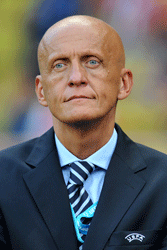 World Soccer: So what exactly are the objectives of your current role with UEFA?
World Soccer: So what exactly are the objectives of your current role with UEFA?
Pierluigi Collina: Today the big question is background, preparation. There was a time when that meant knowing the rules and knowing the interpretation of the rules. Referees today must make the leap from being merely officials to becoming athletes because today’s games are played at a much higher pace than previously.
If you’re tired you’re not going to be lucid and it is much more likely that you will make a mistake. You must also know a team tactically to reduce the surprise effect. The objective is to try to know the teams well enough so as to be able to predict the way things will go.
For example, if I know a team uses a 4-3-3 line-up then I know the play will develop very differently from a team playing with a 4-3-1-2 line-up. Likewise, you can know that one team plays the offside trap just outside its penalty area, while another plays it much higher, 10 yards closer to the halfway line. You’ve also got to know the characteristics of the players.
For example, a lot of coaches with three men up front like to play a left footer on the right wing and a right footer on the left wing so that when they cut inside the players are on their best foot. If I know this then I can expect the winger to cut inside more often than head for the byline. If I know things like this then I can be ready. I don’t expect the guy to put crosses into the area, but rather to cut inside and play “one-twos” on the edge of the area with the central striker.
How do you view possible technological innovations?
It will obviously be the International Football Association Board which will decide on this technology, not me. My job is to apply their decisions on the field of play. In the Europa League last season and the Champions League this season we have used two extra referees – an experiment that has given very interesting results – so UEFA now would like goal-line referees at the 2012 European Championship in Ukraine and Poland.
How do you see Italian football at the moment?
Sometimes in Italy we fail to appreciate the spectacular nature of football. Let me give you an example, from two matches I watched recently: Koln v Bayern Munich, a game that went from 2-0 for Bayern to a final 3-2 for Koln, and Newcastle v Arsenal, a match that went from 4-0 for Arsenal to 4-4. People were enthusiastic and excited about those games, delighted with the spectacle. On that same weekend in Italy we had Inter beating Roma 5-3.
Yet, listening to the analysis of that game next day in Italy, all I heard was people complaining about mistakes. I think you should be focusing on the spectacle, pointing out the good things that teams did. That’s why people go to the stadium, that’s what gets them involved in football. Unfortunately, in Italy we often forget the primary impact of football and go looking for something negative. This is a big limitation.
This is an extract from an interview published by World Soccer. The full interview can be found in the May 2011 issue of the magazine.






